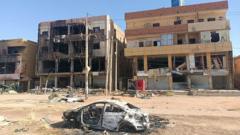**In a Senate hearing, Marco Rubio cautioned that Syria may soon face a full-scale civil war, urging for support of transitional leadership amid rising sectarian strife.**
**Rubio Sounds Alarm Over Potential Syrian Civil War Amid Sectarian Violence**

**Rubio Sounds Alarm Over Potential Syrian Civil War Amid Sectarian Violence**
**U.S. Secretary of State warns of impending collapse as new transitional authorities emerge in Syria following deadly clashes.**
U.S. Secretary of State Marco Rubio has issued a stark warning regarding the escalating situation in Syria, asserting that the nation could be on the brink of "full-scale civil war of epic proportions" within weeks. This alarming prediction comes in light of increasing sectarian violence, particularly after recent clashes that left over 100 people dead, predominantly involving pro-government forces and Druze fighters.
During a session of the Senate Foreign Relations Committee, Rubio highlighted the necessity for support of Syria's transitional authorities, particularly in the aftermath of President Donald Trump’s controversial decision to lift sanctions against the war-torn nation just prior to meeting with Ahmed al-Sharaa. Sharaa, a controversial figure with a history as a former al-Qaeda commander, currently leads the administration that has emerged in the wake of the overthrow of Bashar al-Assad.
Rubio conveyed that Trump's rationale for sanction relief was to facilitate international humanitarian aid, as other nations were hesitant due to the existing restrictions. Despite lifting sanctions, sectarian conflict has intensified, raising questions about the new transitional government’s ability to maintain peace and security.
The U.S. had previously conditioned any sanctions lift on assurances that the rights of religious and ethnic minorities would be protected. Serious concerns linger over the new administration, largely dominated by Sharaa’s Sunni Islamist faction, Hayat Tahrir al-Sham, which remains designated as a terrorist group by numerous authorities, including the United Nations.
Recent months have seen horrific outbreaks of violence, with almost 900 civilians, primarily from the Alawite community, reported killed since March in brutal confrontations between loyalists and government forces. Literal war is feared as tensions simmer, particularly with the Druze minority's involvement in the recent violence.
In his remarks, Rubio noted the fraught atmosphere where minority communities feel increasingly vulnerable under the new leadership. His comments underlined the urgency of U.S. engagement with the transitional government, despite its questionable pasts and methods, emphasizing that inaction would ensure failure.
Meanwhile, during Rubio's testimony, European Union foreign ministers expressed a parallel sentiment, agreeing unanimously to reconsider their sanctions on Syria. EU foreign policy chief Kaja Kallas articulated the bloc's commitment to aid the Syrian populace through reconstruction efforts, echoing international calls for a peaceful, inclusive future in the beleaguered nation.
Rubio's warnings reflect a complex and fragile situation, with the potential for a devastating conflict looming unless significant diplomatic measures are taken. As the U.S. reassesses its role in the region, the fate of Syria hangs perilously in the balance, awaiting international response and support.



















